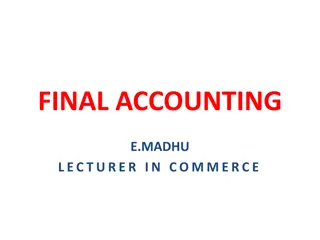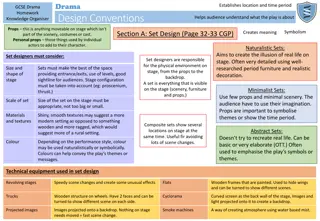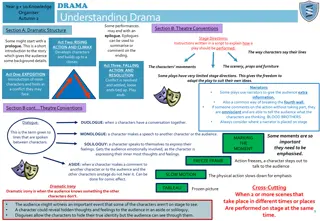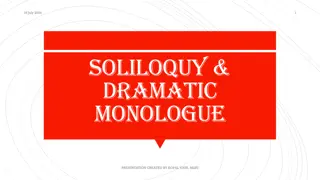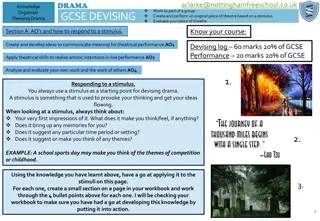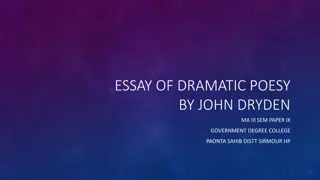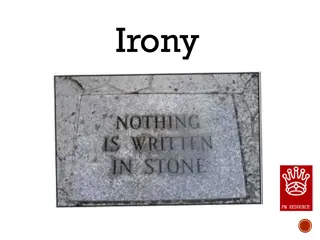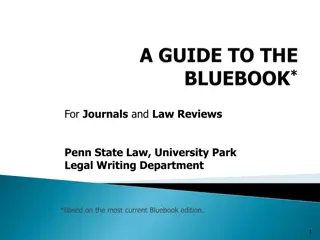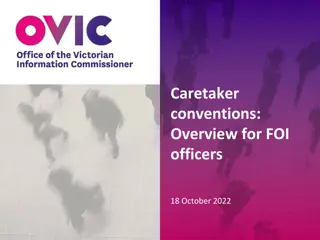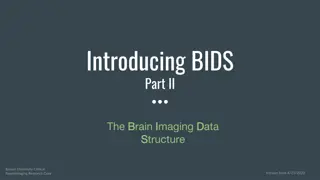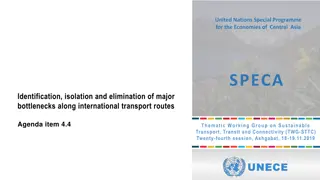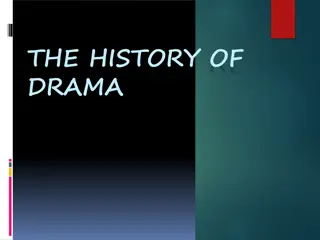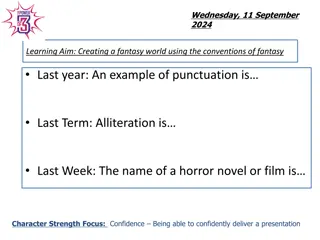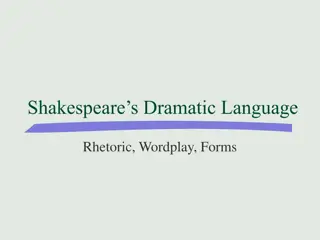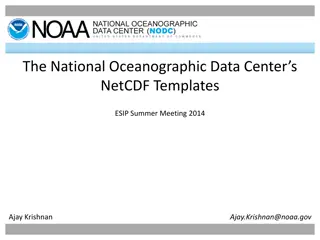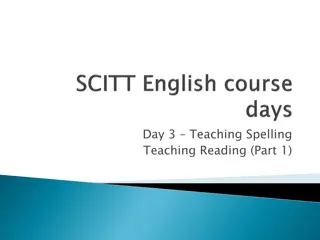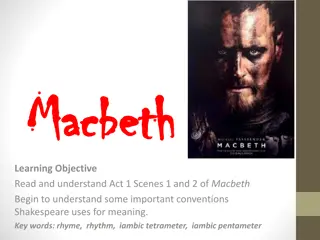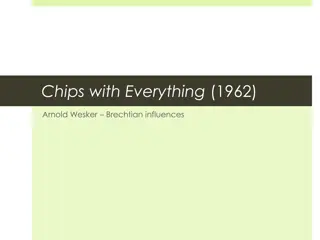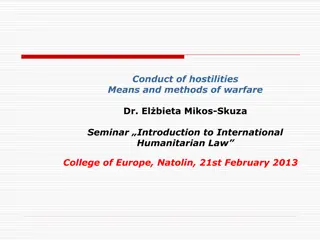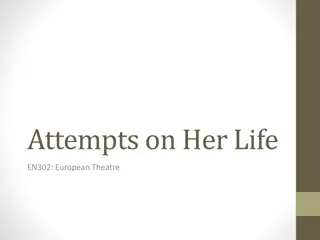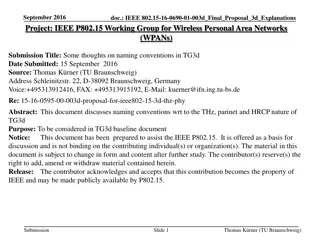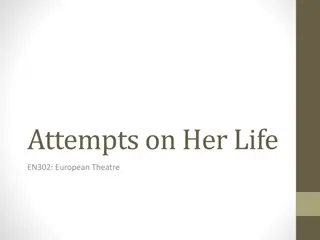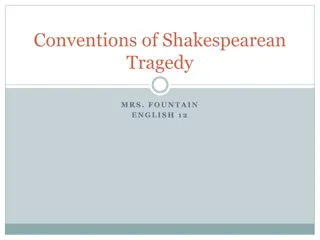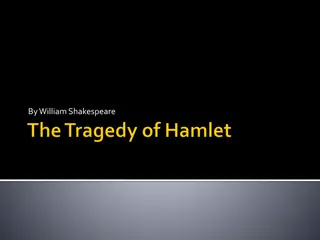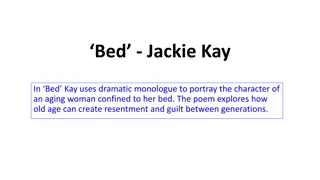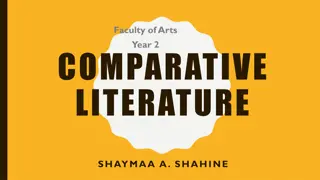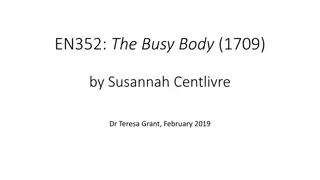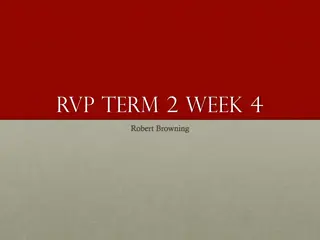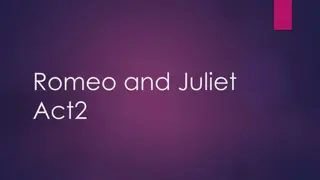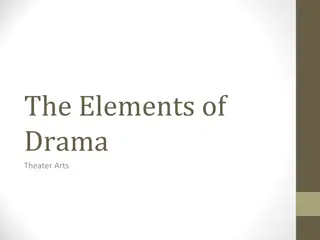Fundamentals of Financial Accounting: Concepts, Conventions, and Cycle
Learn about the systematic process of financial accounting, including identification, recording, measuring, classifying, summarizing, analyzing, and interpreting financial information. Explore essential accounting concepts, conventions, the accounting cycle, rules, journal entries, and ledger manage
11 views • 29 slides
Drama Design Conventions in Set and Lighting for GCSE Drama Productions
This guide delves into the essential aspects of drama design conventions, focusing on establishing location and time period, utilizing props for symbolism, and creating immersive sets using naturalistic, minimalist, and abstract approaches. It also explores the crucial role of lighting in setting th
0 views • 5 slides
Theater Conventions and Characterization in Drama
Theater conventions such as prologues, epilogues, dialogues, monologues, and dramatic structure like exposition, rising action, climax, falling action, and resolution are explored in drama. Additionally, the importance of character creation through techniques like backstories, flashbacks, and flashf
0 views • 4 slides
Understanding Soliloquy and Dramatic Monologue in Literature
A soliloquy is a form of monologue where a character speaks to themselves, the audience, or a surrogate, revealing inner thoughts. This presentation explores different types of soliloquies and their significance in literary works, including examples from Shakespeare's Hamlet. Additionally, it delves
0 views • 9 slides
Devising Drama - GCSE Knowledge Organiser
This GCSE Drama Knowledge Organiser provides guidance on devising and performing an original piece of theatre based on a stimulus. It covers how to respond to stimuli, develop ideas for theatrical performances, apply theatrical skills, analyze and evaluate work, and rehearse and refine the devised p
0 views • 10 slides
Debate on Dramatic Poesy by John Dryden
John Dryden's work "Essay of Dramatic Poesy" is a dialogue among four speakers that debates the merit of classical versus modern drama, the comparison between French and English drama, and the use of rhyme in plays. Each speaker presents arguments showcasing their perspectives on these topics, revea
0 views • 5 slides
Understanding Irony in Verbal, Dramatic, and Situational Contexts
Explore the nuances of verbal, dramatic, and situational irony through examples and explanations. Verbal irony involves saying something different from what is meant, often using humor like puns. Dramatic irony occurs when the audience knows something the characters don't, creating suspense. Situati
0 views • 12 slides
Understanding Accounting Conventions and Principles
Accounting conventions are common practices adopted by accountants through general consensus, different from accounting concepts established by law. Key conventions include full disclosure, consistency, conservatism, and materiality, each guiding the disclosure and treatment of financial information
0 views • 6 slides
Bluebook Guide for Law Reviews and Journals at Penn State Law
The presentation provides a detailed overview of the Bluebook rules and formatting conventions for citing legal sources in law reviews and journals, specifically tailored for Penn State Law students. It covers proper citation forms, typeface conventions, and examples for main text and footnote citat
1 views • 105 slides
Understanding Caretaker Conventions in Government Ahead of Elections
Caretaker conventions are a set of practices followed by governments before elections to ensure fair governance transitions. These conventions aim to preserve the autonomy of incoming governments, prevent unfair advantages, and maintain political neutrality in the public sector. During the caretaker
0 views • 8 slides
Understanding BIDS File Naming Conventions
BIDS (Brain Imaging Data Structure) establishes standardized naming conventions for organizing neuroimaging data. It outlines rules for labeling subjects, sessions, tasks, runs, modalities, and exceptions. The structure helps maintain consistency and facilitates data sharing and collaboration in the
7 views • 11 slides
International Transport Route Facilitation Agreements and Conventions
Identification, isolation, and elimination of major bottlenecks along international transport routes are the focus of the United Nations Special Programme for the Economies of Central Asia (SPECA). Various conventions and agreements, such as the Convention on Harmonization of Frontier Controls of Go
0 views • 13 slides
The Art of Dramatic Writing: Exploring Character Development and Dialectical Approach
Every object and human has multiple dimensions that influence character development in dramatic writing. Understanding the physiological, sociological, and psychological aspects, along with the impact of the environment and dialectical approach, shapes characters' growth and decisions in storytellin
0 views • 12 slides
Exploration of Various Poetry Forms: Descriptive, Narrative, Dramatic, and Metaphysical
Poetry is a diverse art form encompassing descriptive portrayal, storytelling narratives, engaging dialogues, and profound metaphysical insights. Descriptive poetry vividly captures objects and scenes like paintings, narrative poetry weaves interconnected stories, dramatic poetry involves dialogues,
0 views • 11 slides
The Evolution of Drama: A Historical Journey
Drama, originating from ancient Greece, has evolved through the centuries from being a genre of poetry to a distinct theatrical form encompassing tragedy, comedy, and more. The masks of Thalia and Melpomene symbolize the essence of comedy and tragedy, while the Great Dionysia festival in Athens hono
0 views • 41 slides
Understanding Dramatic Monologue in Poetry through "Havisham
Dramatic monologue in poetry is a form where a solitary speaker addresses an audience, offering insight into a character's thoughts and emotions. This exploration often reveals complexities, conflicting viewpoints, and hidden truths. Through examining the character of Miss Havisham from Charles Dick
1 views • 43 slides
Exploring Fantasy Worlds: Conventions, Types, and Challenges
Dive into the realm of fantasy literature and learn about the conventions, types, and differences between fantasy and sci-fi. Uncover the definition of fantasy, explore popular genres, and discover sub-genres like fiction, science fiction, and historical fiction. Engage in thought-provoking challeng
0 views • 17 slides
Building an International Child Protection System: The Hague 1996 Convention
The need for an international child protection system stems from the globalization and increasing situations where children require coordinated actions across national borders. Limitations in national systems prompt the call for international cooperation through tools like conventions and networks.
0 views • 14 slides
Exploring Shakespeare's Dramatic Language and Themes
Shakespeare's dramatic language entails rhetoric, wordplay, and rich forms that offer both pleasure and challenges to readers. His verse showcases density and richness, with characters expressing thoughts through powerful metaphors and figurative language. Examples from "Macbeth" illustrate how imag
0 views • 40 slides
NODC NetCDF Templates for Oceanographic Data Management
Explore the integration of CF and ACDD conventions into the NODC NetCDF templates for organizing oceanographic data. Learn about the benefits, attribute conventions, CF feature types, and how to apply the conventions to your datasets effectively. Use the provided decision tree and examples to stream
0 views • 19 slides
International Human Rights in Occupation Law: Principles and Conventions
Explore the application of international human rights in the context of occupation law, examining key principles like territorial authority, restoration of public order, protection of individuals, and essential provisions for fulfilling obligations under international conventions.
0 views • 33 slides
Exploring Effective Phonics Teaching and Spelling Conventions through History
Explore the development of effective phonics teaching and spelling conventions through reflective logs and historical context. Discover the impact of phonics sessions on understanding and teaching practices, delving into Old English to modern-day practices. Learn about the evolution of language and
0 views • 57 slides
Understanding Irony: Verbal, Dramatic, and Situational Examples
Dive into the world of irony with examples of verbal, dramatic, and situational irony explained through scenarios like sarcastic comments, horror movie twists, and unexpected encounters. Explore how irony adds layers of meaning and depth to storytelling, from characters knowing more than others to o
0 views • 10 slides
Understanding Shakespeare's Conventions in Macbeth Act 1 Scenes 1 and 2
Explore the importance of rhyme, rhythm, iambic tetrameter, and iambic pentameter in Act 1 Scenes 1 and 2 of Macbeth. Dive into the conventions Shakespeare uses for conveying meaning, including the use of rhyme in verse, rhyming couplets, and the significance of rhythm in the witches' opening scene.
0 views • 16 slides
Epic Theatre and Brechtian Influences in Modern Drama
Epic theatre, influenced by Bertolt Brecht, challenges traditional Aristotelian and Hegelian dramatic structures by emphasizing critical engagement and distancing strategies. It uses historical narratives and didactic elements to provoke social consciousness and active spectator participation, contr
0 views • 26 slides
International Agreements on Means and Methods of Warfare Throughout History
Explore the evolution of international agreements regulating means and methods of warfare from the 19th century to the present day, focusing on limitations imposed on belligerents to protect civilians and combatants. Various treaties and conventions such as the Hague Conventions, Geneva Conventions,
0 views • 23 slides
Exploring European Theatre Traditions
European theatre traditions, as discussed through Lehmann's Postdramatic Theatre and Aristotle's dramatic elements, highlight the unique characteristics that differentiate them from non-European traditions. Concepts such as hamartia, anagnorisis, and mimesis are explored along with the rejection of
0 views • 30 slides
Naming Conventions in IEEE 802.15 TG3d Proposal
This document discusses naming conventions in the context of IEEE 802.15 TG3d, focusing on the THz PHY, pairnet concept, and HRCP applications. It distinguishes between TG3d and TG3e, highlighting commonalities and differences in device operations, frequency bands, and application scenarios.
0 views • 9 slides
European Theatre: Exploring Dramatic Elements and Themes
European theatre has a rich history and tradition that distinguishes it from other global theatre practices. From Aristotle's dramatic elements to the conflicts faced by characters like Antigone and Creon, this form of theater delves into themes of recognition, imitation, and conflict. Hans-Thies Le
0 views • 35 slides
Exploring Shakespearean Tragedy: Conventions and Characteristics
Delve into the world of Shakespearean tragedy through the examination of key conventions such as the tragic hero, plot development, and themes. Understand the aspects of tragedy and drama, including blank verse, soliloquy, aside, dramatic irony, and foreshadowing. Discover how these elements come to
0 views • 10 slides
Shakespearean Dramatic Techniques Analysis
Explore the intricate use of monologues, soliloquies, structural divisions, and emotional responses in William Shakespeare's plays. Delve into the dialogues between characters like Hamlet, Gertrude, and Claudius to uncover themes of love, madness, and expectation. Discover how Shakespeare utilizes d
0 views • 23 slides
Analysis of "Bed" by Jackie Kay: Themes, Form, and Use of Scots
Bed" by Jackie Kay is a dramatic monologue portraying the perspective of an elderly woman confined to her bed, exploring themes of aging, resentment, and guilt between generations. The poem uses Scots to add immediacy to the narrative, highlighting the woman's reliance on her daughter and contemplat
1 views • 34 slides
Exploring Character Creation and Dramatic Conventions in Drama Class
Using a short piece of text as a stimulus, students in a drama class dive into creating characters and exploring dramatic conventions to craft scenes depicting different aspects of their characters' lives. The story unfolds in Hell's Alley, where tension and conflict shape the protagonist's experien
0 views • 10 slides
Exploring Dramatic Forms: From Burlesque to Well-Made Plays
Dive into the world of dramatic forms, where Burlesque emerged in Medieval Drama and was revived in the Seventeenth Century to satirize serious works. Learn about high burlesque that parodies literary works like Alexander Pope's "The Rape of the Lock" and low burlesque that mocks serious subjects. D
0 views • 9 slides
Comedy Evolution in Restoration Drama
Explore the evolution of comedy in Restoration drama, from the types of comedy to the major playwrights and their contributions. Learn about the dramatic and theatrical themes, conventions, and trends of the period 1660-1709, including the shift towards humane intrigue comedy and the influence of Sp
0 views • 15 slides
Analysis of Robert Browning's Dramatic Monologues and Implied Audience
In this content, we delve into the elements found in the dramatic monologues of Robert Browning, focusing on implied addressees, ideal recipients, and the implications of the dramatic form on the relationship between speaker, addressee, and reader. We explore how the presence of an implied audience
0 views • 5 slides
Analysis of Literary Devices in Romeo and Juliet Act 2
In Act 2 of Romeo and Juliet, the characters use various literary devices such as allusion, dramatic irony, hyperbole, and foreshadowing. Mercutio mistakenly believes Romeo is still in love with Rosaline, showcasing dramatic irony. Additionally, Friar Lawrence's words foreshadow the danger in Romeo
0 views • 10 slides
Understanding Irony: Types, Purpose, and Examples
Irony is about expectations and contrast between reality and what is being said. It can add interest, depth, suspense, and humor to texts. The three types of irony are verbal, dramatic, and situational, each serving a unique purpose to engage the audience. Examples from popular stories like Beauty a
0 views • 12 slides
Understanding Drama: The Art of Theater Expression
Drama, originating from the Greek word "Dran" meaning to act, is a form of storytelling performed in front of an audience. It differs from prose and poetry by providing a unique experiential aspect through live enactments. Essential elements such as playwrights, actors, acts, scenes, and dramatic sp
0 views • 15 slides
Pointer and Reference Conventions in C++ Programming
Understanding the conventions for passing pointers and references in C++ is crucial for safe and effective programming. Different forms allow various levels of control, from read-only access to modification rights, each signaling a specific intent. These conventions help prevent unexpected behavior
0 views • 21 slides
